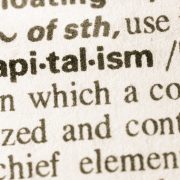All life forms have three requirements – glue (proteins), a memory chip (DNA), and a concentrated energy source (mitochondria). Modern human economic life also has three essential elements. One is ethical, one is elegant, and one is metaphysical. The ethics of trading value for value is rooted in trust. As economist Walter Williams explains, “Honesty and trust are not simply matters of character and morality; they’re crucial for efficient human interaction and a smoothly working economy.” Trust is the glue.
The elegance is a dynamic system of finance rooted in sound money. As economist Carl Menger tells us, “Money came to be money quite naturally, as the result of economic relationships that were independent of the power of the state.” Money is an emergent phenomena, and because of its nature, it becomes readily accepted as a medium of exchange and a reliable store of value. Finance is the memory chip, money is the electrons that flow through it.
Metaphysics deals with substance, identity, cause, time and space. Energy is derived from substances whose nature allows us to produce, cook, build, travel, communicate and live lives of meaning that is unprecedented in human history. According to author Alex Epstein, it is an unassailable fact that the exploitation of concentrated forms of energy “has enabled billions of people to live longer and more fulfilling lives.” Manufacturing, cooking, construction, travel and communication are no longer dependent on human or animal muscle powered by mitochondria fueled by fat. Hydrocarbons are the fat that fuels modern machinery.
John D. Rockefeller is the Poetic Justice Warrior who perfected the complex system for the refinement and mass distribution of hydrocarbons that benefits all of human life. Regarding food production alone, hydrocarbons are essential for the harvesting of the macronutrients (fat, protein and carbohydrates) that fuel everyone’s muscles and central nervous systems.
The Model of Entrepreneurship
Rockefeller was a principled and frugal man. He was the oldest of eight children in a strong family that frequently experienced financial hardship. By the time he was 16 years old he knew the virtues of self-reliance and the fundamentals of free enterprise better than anyone twice his age.
As he wrote to a business partner in 1885, “Let the good work go on. We must ever remember we are refining oil for the poor man and he must have it cheap and good.” This is the mission of the entrepreneur – anticipate the needs and desires of customers and deliver more, better and cheaper. With the conclusion of the Civil War, Rockefeller became intrigued with the fledgling oil refining business and utterly repelled by the waste and pollution of the government subsidized oil extraction business. He built the most efficient refineries by hiring his own plumbers and cut the cost of labor, pipes and plumbing materials by half. He bought his own timber, kilns, horses and wagons to manufacture his own barrels and cut their cost by 60%.
Profits were reinvested in more and better equipment, and chemists. Waste was anathema to Rockefeller, and he developed over 300 byproducts from each barrel of oil besides kerosene. At the time, they included gasoline, lubricants, paints, tar and anesthetics, or as Rockefeller puts it,
We had vision. We saw the vast possibilities of the oil industry, stood at the center of it, and brought our knowledge and imagination and business experience to bear in a dozen, in twenty, in thirty directions.
And it was kerosene that Rockefeller wanted to perfect. Standard Oil became the gold standard for a consistently pure and cleaner fuel for illumination, and it eventually served 90% of the vastly increased market. During the 1870s, the price dropped from 26 cents per gallon to 8 cents. According to history professor Burton Folsom,
Before 1870, only the rich could afford whale oil and candles. With the drop in the price of kerosene, working-class people all over the nation could afford the one cent an hour that it cost to light their homes at night. Working and reading became after-dark activities new to most Americans.
The benefits to everyone for more learning and more productive activity are nearly impossible to comprehend, and eventually proven in Julian Simon‘s The Ultimate Resource.
The Virtue of Efficient Monopoly
Of course no good deed goes unpunished in the world of government bureaucrats and social justice warriors whose wealthy parents sold their refineries to Standard Oil. Rockefeller has since been vilified as a greedy monopolist and a cut throat capitalist. In 1911 the US Supreme Court ruled Standard Oil of Indiana in violation of the Sherman Antitrust Act and fined it $29 million for taking railroad fee rebates offered by railroad haulers to its best customers, an amount over seven times the value of the entire property in question.
But what is Antitrust anyway? As described by Poetic Justice Warrior Ayn Rand, it is very simple. If government regulators think your prices are too high, you are guilty of price gouging. If they think your prices are too low, you are guilty of predatory pricing. And if they think your prices are competitive, you are guilty of collusion. In Rockefeller’s case, he was accused of selling oil below cost in order to drive competitors out of business or buy them out. This is a lie. He sold oil below their cost of production, not his. Rockefeller and his senior managers were talented price discoverers in the complex business of a horizontally integrated energy company. This benefits everyone, everywhere, all of the time. When buying a competitor, Rockefeller would not pay up for outmoded equipment, but he would pay a premium for talented people and a company’s goodwill. This is Poetic Justice.
According to historian and economist Lawrence Read, there are two kinds of monopoly – coercive and efficiency. A coercive monopoly results from the government granting exclusive privileges, subsidies, immunities or costs on others. Think of the US Postal Service, or government itself. An efficiency monopoly emerges when a company merely does the best job, and here is how Rockefeller did it,
Rockefeller was a managerial genius—a master organizer of men as well as of materials. He had a gift for bringing devoted, brilliant, and hard-working young men into his organization.
It is impossible to consider Standard Oil a coercive monopoly. It is impossible for them to underprice their costs for any extended period of time or grow to dominate their industry without already being the best. Regardless, new ideas, technology and changing consumer demand are the final arbiter in a world of political and economic freedom. For Rockefeller, electric lights eventually replaced kerosene lamps and massive oil fields were found in the southwest.
The Poetic Justice Warrior
John D. Rockefeller’s accumulation of wealth was rooted in core principles that are identical to those for his distribution of wealth. As Folsom puts it,
Rockefeller attacked social and medical problems with efficiency and innovation. Schools, cities, or scientists who weren’t anxious to produce or improve didn’t get Rockefeller money. Those who did and showed results got more.
As Poetic Justice would have it, Rockefeller trusted and rewarded his officers and employees and his customers trusted Standard Oil. He financed his acquisitions with money earned by creating extraordinary value – the ultimate Carbon Dividend Plan, not the fraudulent one. And he fueled his innovations with the macronutrients essential for life on earth – carbohydrates for individual minds and hydrocarbons for humanity. While Carl Menger created the economic system of value and price theory, Rockefeller created the industrial system that practiced it to perfection, and he did it with meticulous serenity.













